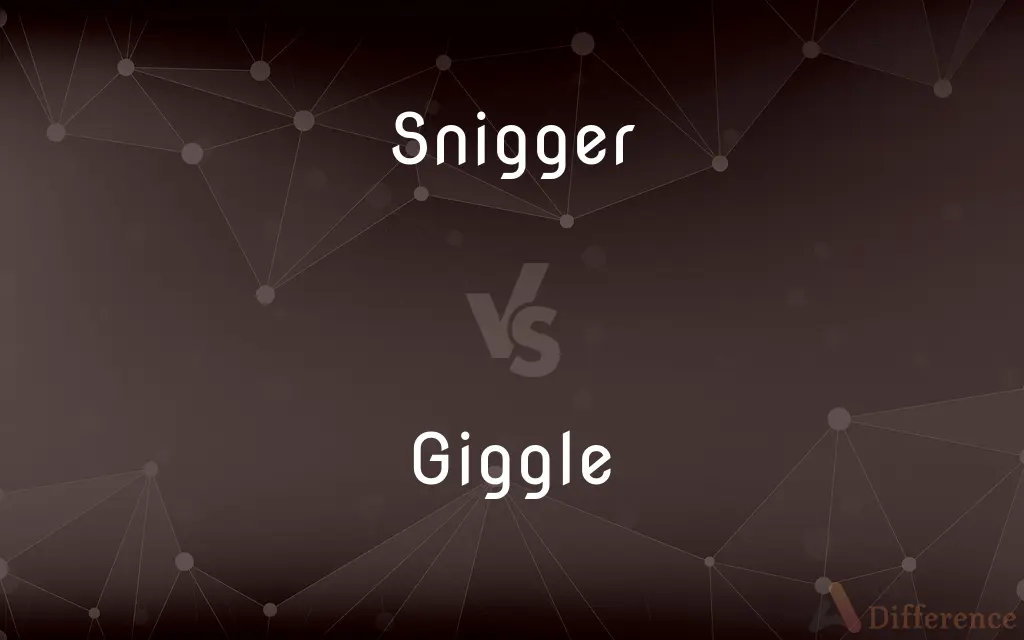Snigger vs. Giggle — What's the Difference?
By Tayyaba Rehman & Fiza Rafique — Updated on April 24, 2024
Snigger involves a suppressed, often malicious laugh, while a giggle is a light, often uncontrollable laugh usually from amusement or nervousness.

Difference Between Snigger and Giggle
Table of Contents
ADVERTISEMENT
Key Differences
A snigger is typically a quiet, restrained laughter that might carry a hint of derision or superiority, often used when finding humor at the expense of someone else. On the other hand, a giggle is a spontaneous and airy laughter, reflecting delight or nervousness without any underlying malice.
Sniggers are often shared between individuals in a knowing way, perhaps as an inside joke or when mocking something discreetly. Whereas, giggles are more likely to be a shared response among groups to something universally seen as funny or awkward.
The context in which a snigger is used can sometimes be secretive or conspiratorial, suggesting a shared understanding of mockery. In contrast, giggles are commonly associated with innocence and light-hearted situations, free of any critical undertones.
Sniggers may not always be audible enough to be recognized by everyone present, which is part of their covert nature. Conversely, giggles are typically louder and more noticeable, often contagious among young and old alike.
A snigger can be seen as somewhat socially negative, as it might alienate or hurt others who perceive the laughter as directed towards them. On the other hand, giggling is generally viewed positively, enhancing social bonds and spreading joy.
ADVERTISEMENT
Comparison Chart
Volume
Low, often barely audible
Light but clearly audible
Connotation
Can be malicious or mocking
Generally positive and joyful
Social Context
Often used in secretive or mocking contexts
Common in openly joyful or awkward moments
Emotional Underpinning
Derision, superiority
Amusement, nervousness
Contagiousness
Less likely to spread among groups
Highly contagious, especially in groups
Compare with Definitions
Snigger
A snigger is a sly or disrespectful laugh.
He tried to stifle a snigger when he saw her mismatched shoes.
Giggle
A giggle is a light, often uncontrollable laugh.
Her joke made the whole room giggle.
Snigger
A snigger can be a quiet, muffled chuckle.
She sniggered under her breath during the serious lecture.
Giggle
Reflects amusement or mild embarrassment.
She giggled nervously during her presentation.
Snigger
It can reflect superiority or scorn.
They sniggered at the newcomer's naive question.
Giggle
Common among friends sharing a light moment.
They giggled at the memory of their last adventure.
Snigger
Typically a private or shared response among a select few.
The co-workers sniggered over the boss’s obvious typo in the email.
Giggle
Often occurs in response to silliness or playfulness.
The funny movie set off peals of giggles from the children.
Snigger
Often implies laughter at someone else's expense.
The students sniggered at the error in the teacher's presentation.
Giggle
Can be a bubbly, infectious sound.
The toddler’s giggle was so sweet and contagious.
Snigger
A snicker.
Giggle
To laugh with repeated short, spasmodic sounds.
Snigger
To snicker.
Giggle
To utter while giggling.
Snigger
A partly suppressed or broken laugh.
Giggle
A short, spasmodic laugh.
Snigger
A sly or snide laugh.
Giggle
To laugh gently in a playful, nervous, or affected manner.
The jokes had them giggling like little girls all evening.
Snigger
(intransitive) To emit a snigger.
Giggle
A high-pitched, silly laugh.
Snigger
See Snicker.
Giggle
(informal) Fun; an amusing episode.
We put itching powder down his shirt for giggles.
The women thought it would be quite a giggle to have a strippergram at the bride's hen party.
Snigger
See Snicker.
Giggle
To laugh with short catches of the breath or voice; to laugh in a light, affected, or silly manner; to titter with childish levity.
Giggling and laughing with all their mightAt the piteous hap of the fairy wight.
Snigger
A disrespectful laugh
Giggle
A kind of laugh, with short catches of the voice or breath; a light, silly laugh.
Snigger
Laugh quietly
Giggle
A foolish or nervous laugh
Giggle
Laugh nervously;
The girls giggled when the rock star came into the classroom
Common Curiosities
When do people usually snigger?
People snigger when they find humor at someone's expense or in secretive contexts.
What is a giggle?
A giggle is a light, uncontrollable laugh often caused by amusement.
Is giggling considered positive?
Yes, giggling is usually seen as a positive reaction indicating joy or nervous amusement.
What triggers giggles in groups?
Silly or awkward situations commonly trigger giggles in groups.
What is a snigger?
A snigger is a suppressed, often mocking laugh.
Can a snigger be hurtful?
Yes, sniggers can be perceived as hurtful or mocking, especially if directed at individuals.
How can you tell if someone sniggered?
Sniggers are usually quiet and may be accompanied by a smirk or glance.
Do giggles always indicate happiness?
Giggles usually indicate happiness but can also be a response to nervousness or discomfort.
Is sniggering rude?
Sniggering can be considered rude if it’s seen as making fun of someone else.
Is it common for adults to giggle?
Yes, adults can giggle, especially in light-hearted or humorous situations.
In what contexts might sniggering be acceptable?
Sniggering might be acceptable in contexts where an in-joke or sarcasm is shared among close friends.
Why do people giggle nervously?
Nervous giggles are often a response to anxiety or discomfort in social situations.
What is the difference between a giggle and a snigger in terms of sound?
A snigger is more suppressed and quiet, while a giggle is lighter and more audible.
Can sniggers be contagious like giggles?
Sniggers are less likely to be contagious compared to the often infectious nature of giggles.
What is the best way to respond if someone sniggers at you?
Responding calmly or ignoring the behavior is often the best way to handle being sniggered at.
Share Your Discovery

Previous Comparison
Faucet vs. Spigot
Next Comparison
Petroglyph vs. HieroglyphAuthor Spotlight
Written by
Tayyaba RehmanTayyaba Rehman is a distinguished writer, currently serving as a primary contributor to askdifference.com. As a researcher in semantics and etymology, Tayyaba's passion for the complexity of languages and their distinctions has found a perfect home on the platform. Tayyaba delves into the intricacies of language, distinguishing between commonly confused words and phrases, thereby providing clarity for readers worldwide.
Co-written by
Fiza RafiqueFiza Rafique is a skilled content writer at AskDifference.com, where she meticulously refines and enhances written pieces. Drawing from her vast editorial expertise, Fiza ensures clarity, accuracy, and precision in every article. Passionate about language, she continually seeks to elevate the quality of content for readers worldwide.














































